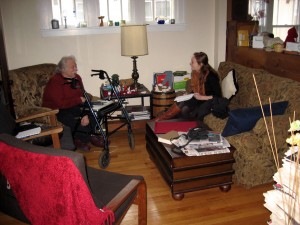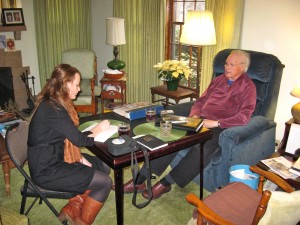#499 – Dick Bernard: Political Communication; Communication in the U.S. Political Sphere
This mornings e-mail brought a most interesting post from Just Above Sunset (JAS), one of my favorite bloggers. Today’s post, Longing for Vigilante’s, concerns Politics and the Communications Profession. It is quite long, but worth the read, and accessible here*. I filed an off-the-cuff comment (later in this post, certainly a “rant”), and the entire conversation brought to mind a reflection on political communications in days gone by….
Some years ago I read a fascinating historical novel, Bones of Plenty by Lois Phillips Hudson.
Hudson’s novel is set in rural North Dakota in 1934, in the area of a small town west of Jamestown, and not far from where my Uncle Vince has spent his entire life. Vince was 9 years old in 1934 (he just turned 87), and in conversations he has described that year as the worst year in the Great Depression.
There is much to this novel, but what brought it to mind today was reflecting on how communications took place in 1934. There were newspapers and journals, then, many of which printed most anything submitted by readers. There was no glut of information. Some citizens had telephones; radio, while existing, was not accessible to the masses.
The main way people communicated, then, was in person, face-to-face, after church, in the saloon, at the town hall, or in assorted settings in the town and country.
These were not people who necessarily agreed with each other: some loved Roosevelt, some hated him. There were all of the things that cause relationship dilemmas in the present day. But the fact of the matter was that they were stuck with each other, and as a consequence, whether they liked it or not, they had to figure out ways to survive, together.
It occurs to me that we no longer feel that need to relate with others, politically, and we are hurting ourselves immensely, as a country. We isolate ourselves in “pods” of particular interests/biases.
This is unhealthy to the future of our society.
*
After I read Just Above Sunset, I dashed off the following, which I have chosen to not edit in any way. Best to catch the emotions of the moment. It is my rough draft, as it were.
The photos at the end of this post are of elders and a student in conversation two days ago in Minneapolis. It was a privilege to witness their chats.
Here’s to real, genuine, communication as it used to be!
*
(Posted to Just Above Sunset [Jan. 13 2012]) “[I begin with] my last sentence, apologizing for the length of the following rant. Sorry. I hope at least one person reads this!
There is certainly research around on this most important topic, but nobody will read it.
My guess: most Americans don’t even read headlines, much less content, and in these days can’t be bothered with discerning fact, so they depend on their outlet of choice: Fox, Daily Kos…endless similar sources right and left.
I’m just a common dog in all of this. I’ve noted that the first paragraph and the last are important. the headline may or may not be unbiased. Pundits often stick in the middle of their column, somewhere, a CYA paragraph, in case somebody calls them out for their bias. They can then say, truthfully, what is really false: “see, it was right there, and you just didn’t read it.” The lead story on TV is always sensational, and there is no “depth of coverage” worth those words outside of, perhaps, 60 Minutes. And on an on and on.
There is a lot of money to be made by the media in political advertising, and we schmucks will pay the bill through campaign contributions to our favorite candidates.
Years ago I coined a phrase, [essentially] “we have too many news people, and too little news” [actually, “more ways to communicate less“]. Of course, as I say, I’m just a common dog and have no way of proving that, and the words are too common to do a productive internet search of that and prove my case. But “my” phrase has been out there for years.
We have become a nation of idiots.
‘Opinions’ have replaced any semblance of ‘facts’ or ‘truth’.
Or maybe we haven’t lost it all just yet.
Just a couple of days ago an elderly friend of mine (actually, he and I are the same age, but what the hey?) was talking with a young woman, who’s working on her senior thesis at her university in Philly area. [first photo, below. click to enlarge] I had taken her over to see him. She happened across me last summer, and I think she’s glad she did. He observed to her, and I agree with him, that the vast majority – the silent middle in this country – is up to something. But it’s quiet and uninteresting and too hard to ferret out, so it won’t make the news. If he’s right, and I think he is, we’re at a time of a profound shift in attitude, but it’s far too boring to cover: like watching paint dry. News is entertainment today.
My college friend is the future we’re, pardon my French, ‘shitting’ on as we play our games. They will remember. We lived in the golden age of “America”, and we lost perspective. Who doesn’t know someone who’ll freely admit “I’m spending my kids inheritance.” It’s more than our kids money we’re spending. We’re spending their future, too.
So the commercial media (which unfortunately includes almost all media now – even lonely bloggers need to pay for their computer) will continue to “ambulance chase”, and in one way or another adopts the famous mantra: “we report, you decide”. And the politicians and their image makers will lie through their teeth, knowing it doesn’t make any difference at all: today’s quote is all that matters, and that people will forget by election day.
As a disinterested relative of mine is fond to say, “they all lie”, which gives her permission to ignore any responsibility for her own choices.
One parting shot: last spring we saw a movie that came and went quickly, but is back in DVD and on demand as of Jan 3, 2012. It is called I Am, The Documentary. I wish everybody in the world could see it, and then talk about it. Check it out on the internet. As the subtitle says: “The shift is happening”.
I hope.”
Sign me: someone who cares.
UPDATE January 14, 2012
* – Comment intended for “Rick the news guy” referred to in Just Above Sunset. Rick was apparently on the “ground floor” at the founding of CNN. I don’t know if this comment will reach Rick. I rarely watch CNN now, but what I see suggests that it at least is attempting to act as a legitimate news source, compared with someone like Fox News (to me, “faux news”).
I thought you might be interested in the following:
I spent considerable viewer time with CNN in the early years of the station. My first vivid memory was Wolf Blitzer reporting from wherever he was during Desert Storm in 1991. He did a great job, as I recall.
In October, 1996, I was watching CNN when I finally had enough and turned off the television, permanently. It was in the heat of the political season and one Newt Gingrich looked me straight in the eye through a CNN camera and told a bald-faced lie, with great sincerity. It was my last straw. I don’t remember what the lie was, but I know it was Newt. I wrote a column about it which was published in my college town paper in December of that year. The column is [Politics 1960 vs 1996001].
I am no longer a TV fan, though I watch it for brief times, including evening news. I pretty rarely watch CNN these days.
The most recent experience with CNN was another unfortunate one: I went to Haiti in December, 2003, and spent a week there learning about Haiti from people who were favorable to President Aristide, including his foreign press liaison. This was a time of tension before the coup, and, in fact, we were in the press liaisons home when she got the phone call about the big demonstrations forming near the capitol.
I really knew nothing about Haiti before that trip, and I was astonished at the diametrically opposed ‘spin’ from the American government and press, and people who liked and respected Aristide, particularly when it became clear that he was to be deposed largely through U.S. efforts [personal opinion here].
One of the worst events for me was one evening when I learned that CNN would be interviewing President Aristide in Port-au-Prince. I think the guy doing the interview was Anderson Cooper, though I could be wrong on that. It’s not terribly relevant. What turned me off was how condescending and dismissive the CNN interviewer was to Aristide. He was treated like he was some small town mayor, rather than as President of a country. I’ve never forgotten that.
The news business is difficult, no doubt. I do know a bit about how it works, and I don’t think it is working at all well today.
Thanks for listening.


